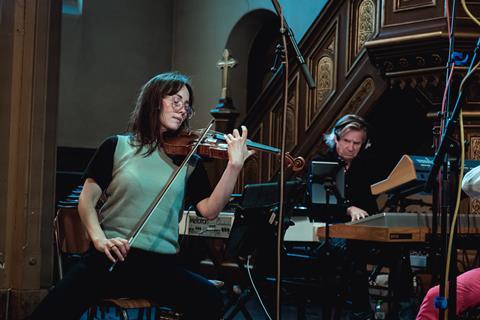The Swedish violinist answers our questions about a newly commissioned concerto, plus exploring electro-acoustic soundscapes

Discover more Featured Stories like this in The Strad Playing Hub
Patientia is an interesting title, could you explain what it means and how it relates to this recording?
I was so focused on the long process of making this recording, it was only at the very end I realised I hadn’t given the title a thought. Naturally, I went through the titles of the movements and found that Patientia, the last track of the recording, really summed up what I put into this project. I’ve wanted to make a solo recording for so long but never found music that felt natural to me to record, and I wanted to wait for those pieces that really spoke to me. When I met Kjetil Bjerkestrand and his universe of electro-acoustic music, I immediately knew I’d found what I waited for. And from that point, to arrange the whole recording; applications, planning, booking and so on, has taken a lot of patience, hence the title, Patientia.
The violin concerto from Kjetil Bjerkestrand was commissioned by yourself, how did this come about? And why specifically Kjetil? Have you commissioned anything before?
Kjetil is the king of analogue synthesisers and he made me really fall in love with the instrument. The combination with acoustic strings creates a sound world that I can swim in for eternity. Kjetil is also an amazing musician and human being- a humble genius!
A while back I played a couple of concerts with him, and after the last one I had some (/lots) of wine and dared to ask if he would be interested in writing a violin concerto for me. I had the score in my hands six months later!
I’d never commissioned anything before, but got bitten by the bug and now I’ve commissioned two more pieces.
Listen: The Strad Podcast Episode #9: Anne Akiko Meyers on new commissions
Read: ‘Travelling with the cello doesn’t get any easier’: Maja Bogdanović
Tell us about some new violin techniques, sound worlds and styles in the recording. How do they impact the performance?
We recorded both Kjetil’s concerto and Philip Glass’s concerto, also containing synthesiser, acoustically. That gave us the opportunity to play in a way that blended the electronic and acoustic sounds. The soundscapes feel pretty innovative to me; I always wanted to play the violin with the impact of electronic music, and Kjetil’s writing allows me to do that. Kjetil is also playing on the record and he gave me and the other musicians so much trust and space which was incredibly liberating, a real joy!
Why did you choose to pair Bjerkestrand’s concerto with Glass’s American Four Seasons?
I came across Glass’s concerto through a friend when I was trying to work out the coupling for the disc. My first instinct was a huge attraction to the music and its untraditional form: eight movements in total, with four solo movements.
I was initially a bit sceptical of the piece because of the harpsichord-sounding part I heard (I do love the harpsichord, just not for this piece). But after a bit of research, and discussions with some performers close to Glass, I realised it was written for an undefined keyboard. Then it felt like such a fitting companion with Kjetil’s concerto, to use the same electro-acoustic soundscape, and I think that also really adds to Glass’s unique sound world.
Which contemporary musicians and composers do you identify with the most, and why?
Pekka Kuusisto is the first person I think of. I’m lucky to be part of The Norwegian Chamber Orchestra and Pekka is our musical leader. He has a fearless ability to do everything his own way, but always enforcing the core of the music. It’s so inspiring to be engaged in that process. He makes me braver to be myself in my own music-making.
Also Patricia Kopatchinskaja - she pushes boundaries in what can be a pretty narrow classics worlds, and makes a bigger space for the rest of us to walk in. What a force of a musician!
Anyone who dares to create their own path, full of knowledge and passion, is a huge inspiration to me.
Sara Övinge’s album Patientia, featuring the Norwegian Chamber Orchestra and Edward Gardner, is out now on LAWO Classics
Read: Session Report: violinist Kerson Leong on Britten and Bruch
Read: How I play both baroque and modern violin: Anna Urpina
Discover more Featured Stories like this in The Strad Playing Hub











































No comments yet